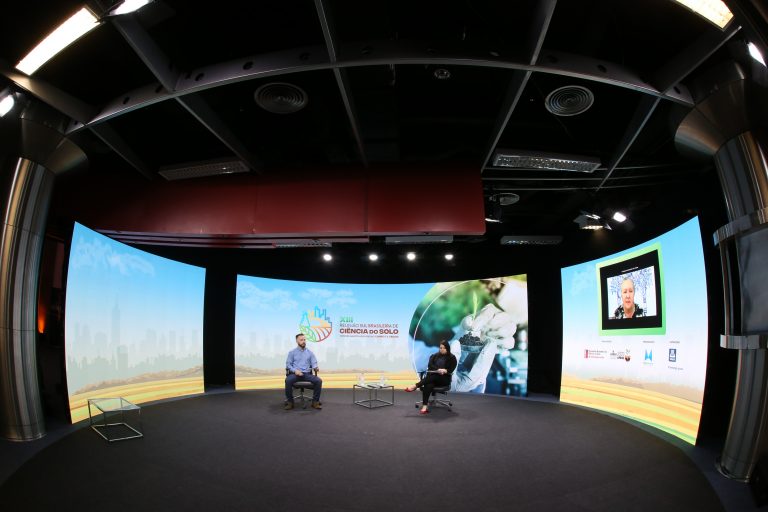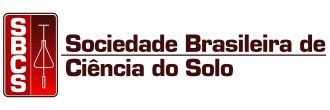
5.000 / 5.000
Editorial
The year 2020 was one of losses for everyone, but also of learning, adaptation and overcoming. It would be no different at SBCS. We learned how to hold online events, live streams, social media discussions, remote classes, etc. Forms of communication already used in other areas have finally been incorporated into our daily lives. Distances became shorter in virtual form. The importance of scientific dissemination was highlighted, beyond academia and to other audiences, democratizing access to major themes and names in soil science, in Brazil and abroad.
In 2020, science revealed its ability to contribute, in the short term, to facing the impact of this terrible pandemic, when efforts and resources are made available. Also noteworthy in Brazil is the importance of public health institutions, the agricultural sector, universities and the various research sectors that have proven to be lifelines for the Brazilian population, for the economy based on agriculture and for the production of knowledge of quality. If we did not do more, it was due to the lack of governance in these sectors, the lack of planning of integrated actions, based on science, and the drastic reduction of investments in important sectors for research financing in Brazil, such as CNPq and CAPES.
Looking to a better future, in 2021 we envision the adaptations that led us to value interinstitutional partnerships as a way of working, such as the PronaSolos technological platform; the valorization of soil biodiversity, the theme of the World Year of Soil in 2020; bringing soil science closer to its users, farmers and managers, developing applied knowledge and technological innovations for sustainable soil management; the overcoming required by forms of remote teaching and the “discovery” of education in soil science, so important for disseminating soil knowledge to society in general and in the training of new generations; the revelation of young soil scientists, including in areas other than agriculture, will change the SBCS.And these changes are very welcome.
Some examples of the actions of SBCS in 2020 and its members are presented in the December Newsletter.We hope you enjoy reading and feel encouraged to become members of SBCS in 2021. We need your support as a member, so that we can continue on the path of representing you in discussions on important topics in the country, always disseminating knowledge in science. soil for the entire Brazilian society.
A Happy New Year to everyone
Lucia Anjos
President of SBCS
2020, the year of lives!
The difficulty in bringing people together at in-person events, caused by the new coronavirus pandemic, also led SBCS to seek new ways of disseminating soil science. Following the trend of lives, SBCS promoted five events from August to December. The lives were a public success, reaching thousands of people, throughout Brazil and with participants abroad. For the president of SBCS, Lúcia Anjos, the experience is here to stay. “Even after the pandemic, when we can meet and hold in-person events again, we will still have the option of promoting hybrid events and major lectures and debates around soil science topics through live streams. They are democratic and reach audiences across soil science and also have the advantage of being able to be seen at any time and included in activities at various educational institutions in Brazil. This was a legacy of this pandemic period that leaves us with a good lesson” said the president.
The lives can be seen on the SBCS YouTube channel (sbcs.solos).
Mapa launches PronaSolos technological platform
The platform brings together maps and soil data produced by the Brazilian Geological Survey (CPRM), Embrapa, the Brazilian Institute of Geography and Statistics (IBGE), state and regional bodies and universities in a geographic information system. The launch marks the beginning of the operation of the National Soil Information System. The first version of the platform includes the data portal, which makes available the different soil mappings and other basic topics through a SigWeb system, while the knowledge portal, integrated with SigWeb, makes available the different interpretations made based on the soil maps .
SBCS celebrates World Soil Art Day
At the beginning of November, SBCS promoted a daily campaign on its social media to encourage its members and followers to promote scientific dissemination actions that had soil as a theme. Throughout the month, we offer suggestions on how to popularize soil science and topics to cover. On December 5th, World Soil Day, Brazil had already registered more than 70 events on the FAO World Map.At least 10% of world events were promoted in Brazil, in the middle of the pandemic. Very good!
Brazilians are successful in producing children’s books about soils in an international competition
Three teams of Brazilians were among the ten finalists in the international competition to produce a book for children about Soil Biodiversity. Brazil registered 12 entries and occupied 3rd, 7th and 9th places and also recorded five honorable mentions. The “Children’s Book Contest on Soil Biodiversity” was launched through a partnership between the International Union of Soil Science (IUSS), FAO/UN and the Global Soil Alliance (GSP) to celebrate World Soil Day, in 2020.
Organizers of the Southern Brazilian Soil Science Meeting invest in online transmission technology to ensure the success of the event
With the theme “Knowledge applied to the countryside and the city”, the Southern Regional Center (NRS) of the SBCS held the XIII Southern Brazilian Soil Science Meeting, on the 26th and 27th of November 2020. For the first time in history, the Meeting took place virtually, aiming to comply with prevention and social distancing measures caused by the COVID-19 pandemic.
The XIII Southern Brazilian Soil Science Meeting had 323 registrants from 18 states, the majority from the NRS coverage area (47% from Rio Grande do Sul and 16% from Santa Catarina).
Organizing committee evaluates holding of the VI Northeastern Soil Science Meeting
The event was held entirely online and brought together 802 participants. The program included 24 thematic conferences, involving 54 speakers, four of whom were foreigners. The opening conference was given by professor Rattan Lal, from Ohio State University and one of the winners of the Nobel Peace Prize in 2017. VI-RNCS was promoted by the Northeast Regional Center of SBCS with support from UFRPE and Embrapa Solos (UEP- Recife)
São Paulo State Center has new board
The São Paulo State Center elected its new board on December 18, 2020 and its director is Professor Estêvão Vicari Mellis (IAC/Apta/SAA Soil Center).
No tags for this post.



